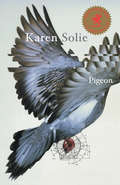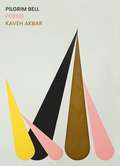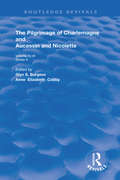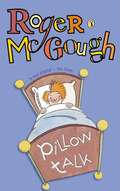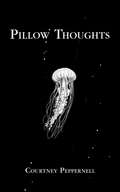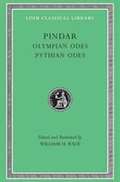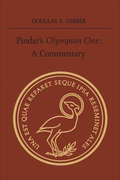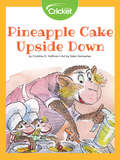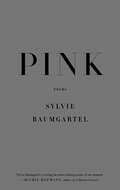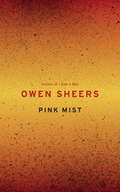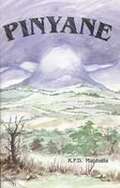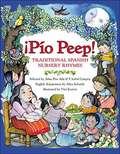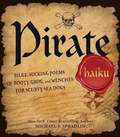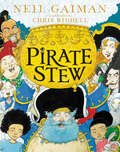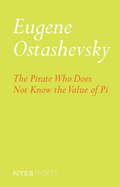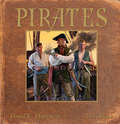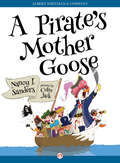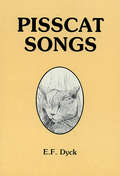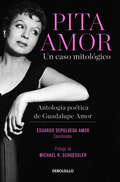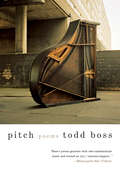- Table View
- List View
Pigeon: Poems
by Karen SolieKaren Solie launched to prominence with her first collection of poems, Short Haul Engine (2001), finalist for the Griffin Poetry Prize and winner of many other awards and citations. She continued her upward trajectory with Modern and Normal (2005), and is now considered one of Canada's best poets. Pigeon is yet another leap forward for this singer of existential bewilderment. These poems are X-rays of our delusions and mistaken perceptions, explorations of violence, bad luck, fate, creeping catastrophe, love, and the eros of danger. Once again, Solie shows that her ear is impeccable, her poetic intelligence rare and razor-sharp.
Pilgrim Bell: Poems
by Kaveh AkbarKaveh Akbar’s exquisite, highly anticipated follow-up to Calling a Wolf a WolfWith formal virtuosity and ruthless precision, Kaveh Akbar’s second collection takes its readers on a spiritual journey of disavowal, fiercely attendant to the presence of divinity where artifacts of self and belonging have been shed. How does one recover from addiction without destroying the self-as-addict? And if living justly in a nation that would see them erased is, too, a kind of self-destruction, what does one do with the body’s question, “what now shall I repair?” Here, Akbar responds with prayer as an act of devotion to dissonance—the infinite void of a loved one’s absence, the indulgence of austerity, making a life as a Muslim in an Islamophobic nation—teasing the sacred out of silence and stillness.Richly crafted and generous, Pilgrim Bell’s linguistic rigor is tuned to the register of this moment and any moment. As the swinging soul crashes into its limits, against the atrocities of the American empire, and through a profoundly human capacity for cruelty and grace, these brilliant poems dare to exist in the empty space where song lives—resonant, revelatory, and holy.
The Pilgrimage of Charlemagne and Aucassin and Nicolette (Routledge Revivals)
by Glyn S. Burgess Anne Elizabeth CobbyOriginally compiled and published in 1988, this volume contains the text and translation of 'The Pilgrimmage of Charlemagne' and 'Aucassin and Nicolette,' alongisde textual notes and a bibliography for both.
The Pill Versus The Springhill Mine Disaster
by Richard BrautiganSelected poems of Brautigan from 1957-1968
Pillow Talk: A Book of Poems
by Roger McGoughWouldn't it be funny if you didn't have a nose? The brilliant and clever Roger McGough asks this and other important questions in this marvellous collection. He also tells you exactly when to cut your fingernails, how to have a real pillow fight and what happens when a burp escapes!
Pillow Thoughts
by Courtney Peppernell<P>Pillow Thoughts is a collection of poetry and prose about heartbreak, love, and raw emotions.<P> It is divided into sections to read when you feel you need them most.
Pilot Impostor
by James HannahamA startling, shape-shifting book of prose and images that draws on an unexpected pair of inspirations—the poetry of Fernando Pessoa and the history of air disasters—to investigate con men, identity politics, failures of leadership, the privilege of ineptitude, the slave trade, and the nature of consciousness.Early in 2017, on a plane from Cape Verde to Lisbon, author and visual artist James Hannaham started reading Pessoa & Co., Richard Zenith's English translation of Fernando Pessoa's selected poetry. This was two months after Trump's presidential election; like many people, ideas about unfitness for service and failures of leadership were on his mind. Imagine his consternation upon discovering the first line of the first poem in the book: "I've never kept sheep/But it's as if I did."The Portuguese, Hannaham had been musing, were responsible for jump-starting colonialism and the slave trade. Pessoa published one book in Portuguese in his lifetime, Mensagem, which consisted of paeans to European explorers. He also invented about seventy-five alter egos, each with a unique name and style, long before aliases and avatars became a feature of modern culture.Hannaham felt compelled to engage with Pessoa's work. Once in Lisbon, he began a practice of reading a poem from Zenith's anthology and responding in whatever mode seemed to click. Even before his trip, however, he had become fascinated by Air Disasters, a TV show that tells the story of different plane crashes in each of its episodes. These stories—as well as the textures and squares of the city he was visiting—began to resonate with his concerns and Pessoa&’s, and make their way into the book.Through its inspirations and juxtapositions and its agile shifts of voice and form—from meme to fiction to aphorism to screenshot to lyric—the book leads us to reckon with the most universal questions. What is the self? What holds the self—multiple, fragmented, performative, increasingly algorithmically controlled, constantly under threat of death—intact and aloft?
Pindar: Olympian Odes, Pythian Odes
by William H. Race Pindar<P><P>My aim has been to produce a readable, clear translation that reflects the grammar of the original Greek, while following the lineation of the Greek text as closely as normal English word order allows. When enjambment of a word is natural to the English, I have imitated the Greek by preserving it; when not, I have maintained the Greek grammatical structure. <P><P> Advisory: Bookshare has learned that this book offers only partial accessibility. We have kept it in the collection because it is useful for some of our members. To explore further access options with us, please contact us through the Book Quality link on the right sidebar. Benetech is actively working on projects to improve accessibility issues such as these.
Pindar and the Emergence of Literature
by Boris MaslovPindar and the Emergence of Literature places Pindar in the context of the evolution of Archaic Greek poetics. While presenting an in-depth introduction to diverse aspects of Pindar's art (authorial metapoetics, imagery, genre hybridization, religion, social context, and dialect), it seeks to establish a middle ground between cultural contextualism and literary history, paying attention both to poetry's historical milieu and its uncanny capacity to endure in time. With that methodological objective, the book marshals a new version of historical poetics, drawing both on theorists usually associated with this approach, such as Alexander Veselovsky, Mikhail Bakhtin, and Olga Freidenberg, and on T. S. Eliot, Hans Blumenberg, Fredric Jameson, and Stephen Greenblatt. The ultimate literary-historical problem posed by Pindar's poetics, which this book sets out to solve, is the transformation of pre-literary structures rooted in folk communal art into elements that still inform our notion of literature.
Pindar's 'Olympian One': A Commentary
by Douglas E. GerberDrawing on an extensive knowledge of the critical history of Olympian One, Professor Gerber here presents a thorough analysis of the language thought, myth, structure, and poetic technique of Pindar's most famous ode. He deals with virtually every word in the poem, elucidating disputed passages, defining Pindar's use of imagery and myth and his structural techniques, and revealing the significance of his statements about the gods, the victor, and his own poetic practice. In doing so he makes a major contribution to Pindaric studies, aiding an understanding of this ode in particular, and of the poet's other works in general.
Pineapple Cake Upside Down
by Christina D. HuffmanThe monkey family makes and eats pineapple upside-down cake.
Pink: Poems
by Sylvie BaumgartelA sharp, visceral new collection of poetry that touches on art, history, sex, bodies, language, and the color pinkThe sack of Rome,The siege of Florence.The lights twinkle pink in Fiesole.Pink furls, pink buds.Wet pink veiny hearts in spring.Pink can mean so many things.Sylvie Baumgartel’s Pink moves from the shadow of the Ponte Vecchio to a mission church in Santa Fe, from Daily Mail reports to a photograph of a girl from Tierra del Fuego, from a grandmother’s advice (“Don’t go to Smith and don’t get fat”) to legs wrapped around “a man who calls me cake.”Baumgartel, a poet of fierce, intimate, wry language, delivers a second collection about art, history, violence, bodies, fear, pain, reckoning, and transcendence. The poems travel back to the historical, linguistic, and emotional sources of things while surging forward with a stirring momentum, creating a whirlwind of birth and destruction.
Pink Mist
by Owen SheersFrom the author of I Saw a Man comes a powerful drama in verse that captures both the trauma of modern warfare and the difficulty of transitioning back to normal life after combat. In early 2008, three young friends from Bristol decide to join the army and are deployed to the conflict in Afghanistan. Within a short space of time the three men return to the women in their lives—a wife, a mother, a girlfriend—all of whom must now share the psychological and physical aftershocks of military service. Written from the points of view of each soldier, Sheers explores not only their experiences in the field of battle, but also the grueling process of recovery following a debilitating injury, the strain of PTSD on a new marriage, and the emotional toll of survivor's guilt among soldiers and their loved ones at home. Drawing on interviews with soldiers and their families, Pink Mist illuminates the enduring human cost of war and its all too often devastating effect upon the young lives pulled into its orbit. A work of great dramatic power, documentary integrity, and emotional intensity.
Pinyane: UBC Contracted
by K.P.D. MaphallaK.P.D. Maphalla ke sethothokisi se sefutho, se tswileng tjaro dithothokising tsa puo ya Sesotho, tsa kajeno. Hara dikgau tseo a seng a di hapile ka bothothokisi, re ka qoholla tse latelang. • Muhope wa Moiloa, 1985 • Mohope wa Mofolo, 1991 Maphalla o se a ngotse dibuka tse fetang 12 tsa dithothokiso. Ho bonahala eka dikgolo di sa tla hobane kajeno ke enwa o phetlela mohatla nku mashodu, o pepesa Pinyane. Re se re tla utlwa teng. Ke eo he, Pinyane.
Pinyane: UBC Uncontracted
by K.P.D. MaphallaK.P.D. Maphalla ke sethothokisi se sefutho, se tswileng tjaro dithothokising tsa puo ya Sesotho, tsa kajeno. Hara dikgau tseo a seng a di hapile ka bothothokisi, re ka qoholla tse latelang. • Muhope wa Moiloa, 1985 • Mohope wa Mofolo, 1991 Maphalla o se a ngotse dibuka tse fetang 12 tsa dithothokiso. Ho bonahala eka dikgolo di sa tla hobane kajeno ke enwa o phetlela mohatla nku mashodu, o pepesa Pinyane. Re se re tla utlwa teng. Ke eo he, Pinyane.
¡Pío Peep! Traditional Spanish Nursery Rhymes
by Alma Flor Ada F. Isabel Campoy Alice SchertleSpanish oral folklore is rich in nursery rhymes and songs. Some rhymes are fragments of ancient medieval ballads; others, such as De colores, are old harvest songs. Some are frequently sung as lullabies, like Este niño lindo, others as finger plays, like Palmas palmitas. Some rhymes accompany games, such as El patio de mi casa, while others are unending rhymes that can be repeated as long as the child wants, like El barquito or La hormiguita. In most cases the rhymes and songs originated in Spain and crossed the Atlantic with the language, to delight children in all the nineteen Spanish-speaking countries of Latin America as well as the American Southwest, occasionally changing along the way. Of the ones we have collected here, three are from Mexico--La víbora de la mar, La piñata, and Tortillitas--the rest are well-known throughout the Spanish-speaking world. We have purposely selected some of the best known and most loved rhymes as an introduction to this genre. To make the selection for this book, we reviewed numerous anthologies from Spain and Latin America, among them those of Carmen Bravo Villasante, Arturo Medina, and Ana Pellegrin in Spain; Elsa Isabel Bornemann and Maria Elena Walsh in Argentina; the series Así cantan y juegan..., published by CONAFE in Mexico, and many more. Finally, faced with the decision to select among hundreds, we chose those nursery rhymes and songs that we cherished in our own childhoods, and those the numerous children--Mexican, Puerto Rican, Cuban, Dominican, and Central American--with whom we have worked love the most. En este libro la palabra se hace canto y juego para los más pequeñitos. Dirigida a niños de uno a seis años, esta maravillosa colección bilingüe de rimas tradicionales infantiles, que han sido transmitidas de generación en generación, que celebra la infancia y la herencia española y latinoamericana, será un fiel acompañante de los niños al momento de dormir o de jugar. Los versos se caracterizan por su gran ritmisidad y las adaptaciones inglesas son excelentes pues mantienen el ritmo, metro y sentido general de las originales, haciendo las rimas tan inolvidables y fácilmente memorizadas tanto en inglés como lo son en el idioma español. Esta colección, ilustrada bellamente por una artista española, está destinada a encantar a los niños y a transformarse en un clásico tanto para los más pequeños como para la familia.
pirate haiku
by Michael P. SpradlinCome sail the seven seas aboard the notorious "Black Thunder. " Readers will have a first-mate seat to the grizzly life of 18th-century pirates--as told by the surprising poetic-if-salty One-Leg Sterling.
Pirate Stew
by Neil GaimanMeet LONG JOHN McRON, SHIP'S COOK . . . and the most unusual babysitter you've ever seen. Long John has a whole crew of wild pirates in tow, and—for one boy and his sister—he's about to transform a perfectly ordinary evening into a riotous adventure beneath a pirate moon. It's time to make some PIRATE STEW. Marvelously silly and gloriously entertaining, this tale of pirates, flying ships, doughnut feasts and some rather magical stew is perfect for all pirates, both young and old.With a deliciously rhyming text from master storyteller Neil Gaiman and spellbinding illustrations by the supremely talented Chris Riddell, this is the picture book of the year! Pirate Stew! Pirate Stew!Pirate Stew for me and you!Pirate Stew, Pirate StewEat it and you won’t be blueYou can be a pirate too!
The Pirate Who Does Not Know the Value of Pi
by Eugene OstashevskyAn original collection from one of the most active poets in contemporary literature.The Pirate Who Does Not Know the Value of Pi is a poem-novel about the relationship between a pirate and a parrot who, after capturing a certain quantity of prizes, are shipwrecked on a deserted island, where they proceed to discuss whether they would have been able to communicate with people indigenous to the island, had there been any. Characterized by multilingual punning, humor puerile and set-theoretical, philosophical irony and narrative handicaps, Eugene Ostashevsky’s new large-scale project draws on sources as various as early modern texts about pirates and animal intelligence, old-school hip-hop, and game theory to pursue the themes of emigration, incomprehension, untranslatability, and the otherness of others.
Pirates
by Dan Burr David L. HarrisonGlamorous, swashbuckling, daring adventurers? Pirates have had good publicity for a long time. But they were really a bunch of misfits, thugs, and ne'er-do-wells who spent most of their time bored, waiting for a few moments of excitement and rich booty that could very well get them wounded or killed, or captured and executed. Still, a pirate's life was chosen by many, and this poetry collection describes the highs and lows and everything in between for those who swore the oath of the Brotherhood.
A Pirate's Mother Goose
by Nancy I. Sanders Colin JackThis selection of popular Mother Goose rhymes is given a delightful pirate makeover! What happens when the cat gives a mate his fiddle? The cabin boy dances a jig and the scalawags waltz in the brig! And Pretty Polly Pirate flies through the town squawking through the locks "Are the children safe in bed? There be pirates at the docks!" From "Rock-a-By, Pirate" to "Rub-a-Dub-Dub (three swabs in a tub)," this collection is sure to inspire the poetic pirate in everyone!
Pisscat Songs
by E. F. DyckEd Dyck finds that you cannot say "piss" on the radio in Saskatoon. There wasn't very much radio promotion of his book. That's a shame. Everybody should know about the cat Jack and the world Dyck compacts around him in 15 "sonnets."
Pita Amor: Antología poética de Guadalupe Amor
by Eduardo Sepúlveda Amor Pita Amor Michael K. Schuessler«Esta antología poética contiene los versos que nosotros, los editores, consideramos más representativos de la poeta Guadalupe Amor. […] Esperemos que este gran esfuerzo tenga el poder para formar a nuevos lectores de la obra poética de Guadalupe Amor, así como también constituir un cuerpo poético digno de sus fieles lectores —algunos desde sus primeros libros— que, a su vez, cumpla con sus rigurosas expectativas literarias.» Michael K. Schuessler «Mujer polémica y contradictoria, Guadalupe Amor, mejor conocida como Pita Amor, fue una poeta admirada -aunque también criticada- tanto por los que la trataron a lo largo de su vida como por los que la han conocido a través de su obra poética. En esta, Pita plasmó y expresó sus angustias existenciales, sus dudas sobre Dios, sus ansias sobre la muerte, sus pulsiones amorosas y eróticas y sus visiones acerca de sí misma y del mundo. En su vida cohabitaron el talento-rayando en lo sublime- con el hedonismo; el arrebato místico con los placeres mundanos; la vanidad exultante con las heridas inferidas por las tragedias personales. Con descarnada sinceridad -sólo en ocasiones y de manera velada-, Pita desnudó a través de su poesía estas facetas de su agitada existencia.» Eduardo Sepúlveda Amor
Pitch: Poems
by Todd Boss2012 Poetry Midwest Booksellers Choice Award winner "[Todd Boss] can make any rhyme feel like a concealed weapon." --Sherman Alexie With poems about loss, home, marriage, and the inner music of our lives, Pitch is a series of variations on an overturned piano. By turns bright and dark like the keys on a keyboard, these poems demonstrate the range of one of contemporary poetry's most musical poets, a master of internal rhyme. from "Overtures on an Overturned Piano" . . . our hi-beams played across the gleaming bed of snowdrifted bramble where it lay, moaning chaotically . . .
